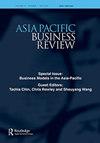The impact of flexibility-oriented HRM systems on innovative behaviour in China: a moderated mediation model of dualistic passion and inclusive leadership
IF 2
4区 管理学
Q3 BUSINESS
引用次数: 4
Abstract
ABSTRACT Drawing on the job demands-resources (JD-R) model, we developed a multilevel model that links flexibility-oriented HRM systems to employees’ innovative behaviour. With a sample of 85 team leaders and 766 employees in China, we found that team-level flexibility-oriented HRM systems were associated with employee innovative behaviour in two ways. On the one hand, flexibility-oriented HRM systems were positively related to harmonious passion, which in turn positively related to employees’ innovative behaviour; on the other hand, flexibility-oriented HRM systems were positively associated with obsessive passion, which subsequently had a negative association with innovative behaviour. Furthermore, the indirect effect of the extent of flexibility-oriented HRM systems on innovative behaviour via obsessive passion was weaker under high inclusive leadership. Implications for research and managerial practices are discussed.中国以灵活性为导向的人力资源管理系统对创新行为的影响:二元激情和包容性领导的调节中介模型
基于工作需求-资源(JD-R)模型,我们建立了一个多层次的模型,将面向灵活性的人力资源管理系统与员工的创新行为联系起来。通过对中国85名团队领导者和766名员工的抽样调查,我们发现团队层面的以灵活性为导向的人力资源管理系统在两方面与员工创新行为相关。一方面,以柔性为导向的人力资源管理系统与和谐激情正相关,和谐激情与员工创新行为正相关;另一方面,以灵活性为导向的人力资源管理系统与强迫性激情呈正相关,继而与创新行为呈负相关。此外,在高包容性领导下,以灵活性为导向的人力资源管理系统的程度通过强迫激情对创新行为的间接影响较弱。讨论了对研究和管理实践的影响。
本文章由计算机程序翻译,如有差异,请以英文原文为准。
求助全文
约1分钟内获得全文
求助全文
来源期刊

Asia Pacific Business Review
Multiple-
CiteScore
4.40
自引率
13.80%
发文量
70
期刊介绍:
The growth of the Asia Pacific region and the rising presence of its multinationals in world markets has raised a number of questions about the origins of national economic success. Asia Pacific Business Review addresses these key issues and draws together the lessons of the analysis of culture, economies, history, politics and societies in the area, in order to explore business-related phenomena in the Asia Pacific countries, both in their general and specific contexts. The Review is intended for both academics and interested observers, contains the contributions of recognized experts, and is essential to anyone seeking the latest research on Asia Pacific business in a readily available, approachable form. We welcome articles which deal with nations and societies in the Asia Pacific region, namely those in East Asia and South-East Asia (but not South Asia), including those in APEC and ASEAN, individually or comparatively. Of interest also are contributions on the Asia Pacific economies, comparing those inside with those outside, or those investing in it. We do not, however, publish papers based solely on countries from outside the region.
 求助内容:
求助内容: 应助结果提醒方式:
应助结果提醒方式:


